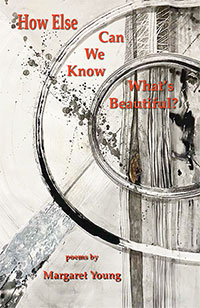 *
*
Interview by Doug Holder (Board of Directors/ New England Poetry Club)
Recently I received a chapbook of poetry from Margaret Young, a former colleague of mine at Endicott College. It is titled, How Else Can We Wonder What’s Beautiful? (Main Street Rag). I decided to send some questions to the poet on a very hot summer’s day. Oddly enough, as I was considering when to write the interview questions, Young’s husband Rocco Gangle, a noted philosophy professor at Endicott College, greeted me at my table at the Bloc 11 Cafe, my usual haunt in Union Square, Somerville. And indeed, Young has the touch of a philosopher in her work. According to Young’s website.
Margaret Young grew up in Oberlin, Ohio. She earned a B.A. from Yale and worked in a traveling theater company before earning an M.A. in creative writing at the University of California, Davis. She has taught writing and theater to all ages and been an artist-in residence in schools, and received an Individual Artist Grant from the Ohio Arts Council in 2005. Her poetry collections include Willow from the Willow, Almond Town, Blight Summer, and How Else Can We Know What’s Beautiful? Her translations of Sergio Inestrosa’s In el espacio improbable de un haiku and Luna que no cesa appeared in 2017 and 2018, respectively. She is one the faculty of the Global Center for Advanced Studies, and lives in Beverly, Massachusetts.
Doug Holder: When you taught at Endicott College you had a popular course on Pop Culture. Some might comment that POP Culture is not appropriate for the rarefied air of poetry. I think when poetry is rarefied it is a problem. Your take?
Margaret Young: I agree that poetry is doomed if it doesn’t embrace pop culture. I include references in my poetry to TV etc. because it’s the stuff of life, just like food or grief, (or the inscrutable philosophy my husband studies.) I hope that comparing the color of pokeweed to the T-Mobile campaign brings those two disparities a little closer, not for any moral lesson, but just on an aesthetic basis, helping people pay more attention to both weeds and ads.
DH: I was intrigued by your line in the poem Art: “We all have regrets. How else can we know what’s beautiful?” Explain.
MY: That’s one of those poems/lines that came to me unbidden, so I’m not sure how to explain. I think it might be the notion that beauty is less about the ideal than about things flawed, not-figured-out. That we learn more from the latter. Anti-Platonist?
DH: In the poem International Water Day at Assisted Living you wonder if the elderly patients who are ‘adrift’ are dreaming about the sea. We started in the sea of the womb, the sea is elemental, seminal. In a way we go back to the waters of our birth or youth, and again when we are in our dotage. Your thoughts?
MY: Yes, yes. My dad’s now in an assisted living facility, and I read him poems every day. We were just discussing Jaques’s speech in As You Like It where the 7th (and last) age of man describes a return to helpless infanthood. I think this occurred when he was telling me they call them not bibs, but “clothing protectors,” in the dining area, not wanting to remind people of this concept.
DH: The poems in your new collection are not wordy, you have a real economy to your poetry. Is this your signature style?
MY: I hope so! I had flirtations with Whitman & Lorca in graduate school, and with performance/slam poetry in the 90s, but feel like I really found my truest voice when I whittled things down, got comfortable leaving big gaps.
DH: You are on the faculty of the Global Center for Advance Studies. Can you tell us a bit about this organization?
MY: GCAS website: https://gcas.ie. Their description: “GCAS (The Global Center for Advanced Studies) began in 2013 with over 100 leading writers, philosophers, professors, artists, and filmmakers. We started as a non-profit in the USA but later incorporated in Ireland as a limited company so we could share ownership with faculty and graduates. We are the first debt-free degree granting institution of higher education co-owned by faculty, financial supporters, staff, and graduates on blockchain and our own crypto-token, GCASy. We offer a few accredited degrees in the European Union via Woolf.”
And, though it’s been mostly my husband teaching in far-flung places (like last summer’s hike-the-Alps-while-studying Nietzche course) I’ve done a series of seminars on ecopoetics, including one about its relationship to permaculture. Gary Snyder once defined bioregionalism as “flying around the world to tell people to stay home.”
DH: Why should we read this book?
MY: Because it’s rooted in place(s), because it’s fun and weird, because you love language.















Reader Comments